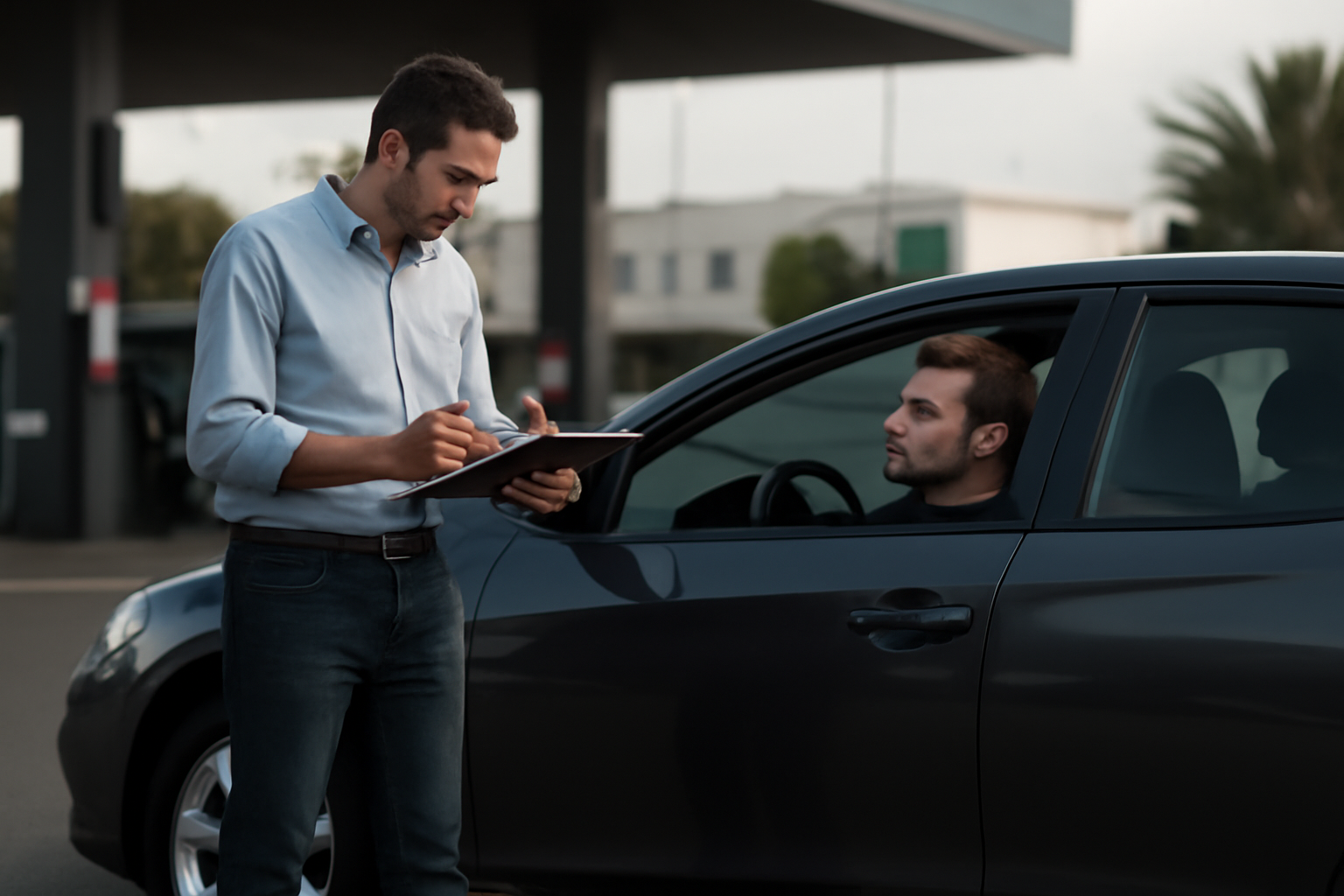

Things to Consider When Buying a Second-Hand Car in Abu Dhabi
Title: Things to Consider When Buying a Second-Hand Car
Keyword Focus: Things to consider when buying a second-hand car
SEO Title: Things to Consider When Buying a Second-Hand Car in Abu Dhabi
Slug: things-to-consider-when-buying-a-second-hand-car
Meta Description: Discover important factors to consider when buying a second-hand car in Abu Dhabi. Get expert tips and find the best deals today.
Image Alt Text: Things to consider when buying a second-hand car in Abu Dhabi
When looking for a second-hand car in Abu Dhabi, it’s essential to make an informed decision to ensure you’re getting a reliable vehicle that meets your needs and budget. Whether you are buying from a dealership or a private seller, there are several key factors to consider. In this guide, we’ll explore the top things to consider when buying a second-hand car to help you make the best decision and avoid costly mistakes.
1. Vehicle History and Documentation
Before committing to a second-hand car, always check its history. A car’s history report is an important tool in understanding its background. It provides information about the car’s previous ownership, any accidents it may have been involved in, service records, and whether it has ever been written off or had any major repairs. Knowing the history can help you avoid cars with hidden problems that might cost you more in the long run.
Ask for the car’s registration documents, service records, and insurance history. A well-documented car is often an indicator of a well-maintained vehicle. Be sure to also check if the car has been involved in any major accidents.
Additionally, you can use online platforms to get a comprehensive report of the car’s history using the Vehicle Identification Number (VIN). This will give you insights into any potential hidden issues that might affect the vehicle’s reliability.
2. Mechanical Condition
The mechanical condition of the car is perhaps the most important factor to consider. A second-hand car might appear clean and well-maintained, but there could be hidden mechanical issues that are not immediately visible. It’s a good idea to have a trusted mechanic perform a thorough inspection of the car before you finalize the purchase.
Check the engine, brakes, transmission, suspension, and other essential systems. If possible, ask for a diagnostic report to ensure the car is in good working condition. If the seller is hesitant to let you get an inspection, it could be a red flag, and you might want to look at other options.
3. Mileage
The mileage of a second-hand car plays a significant role in its overall condition and value. Generally, the lower the mileage, the better the condition of the vehicle. However, mileage is not the only indicator of a car’s health. A car with higher mileage that has been well-maintained may still be a good choice.
Make sure the mileage shown on the odometer matches the car’s condition. If it seems unusually low for its age, ask the seller for more details. Sometimes, sellers may try to manipulate the mileage to make the car appear less used than it actually is. Cross-checking the mileage with service records and the car’s history can help ensure its accuracy.
4. Exterior and Interior Condition
The car’s exterior and interior condition also speak volumes about how well it has been maintained. Inspect the exterior for signs of rust, scratches, or dents. Small issues might be cosmetic, but larger issues could indicate deeper problems, like poor paintwork or previous collisions.
Inside the car, check the seats, dashboard, and upholstery for any damage. Test all the features like the air conditioning, radio, and electronics to make sure everything is in working order. A well-maintained interior suggests the car has been cared for and may be a good buy.
5. Test Drive
A test drive is an essential step when buying a second-hand car. It allows you to get a feel for the vehicle’s performance and comfort. Pay attention to how the car drives on different terrains. Test the brakes, acceleration, and steering to ensure they are functioning properly. Listen for any unusual noises that could indicate mechanical issues.
A test drive also lets you evaluate the car’s comfort. Check the seat position, visibility, and ease of use for the controls. This will give you an idea of whether the car fits your driving style and needs.
6. Price Comparison
Always compare the price of the second-hand car you’re interested in with similar models on the market. Use online platforms to check the current market value of the car based on its make, model, year, and condition. This will help you determine if the price is reasonable.
Be wary of prices that seem too good to be true. If the car is priced significantly lower than similar vehicles, it could be due to hidden problems. On the other hand, if the price is much higher than others on the market, make sure the seller justifies the premium.
7. Warranty and Return Policy
Some dealerships offer warranties on second-hand cars, which can provide peace of mind in case something goes wrong after the purchase. Before buying, ask the seller if the car comes with any warranty or guarantee. A warranty can help you avoid additional repair costs in case of unforeseen issues.
In addition to warranties, check the return policy of the seller. Some dealerships might offer a return policy if you find major issues with the car after purchase. Knowing your options will help protect you in case of a problem.
8. Negotiation
Once you’ve gathered all the information about the car’s condition, history, and market value, it’s time to negotiate the price. Be prepared to haggle and don’t be afraid to offer a lower price if you think the car is not worth the asking price. If you have concerns about the car’s condition, use these as leverage during the negotiation process.
Remember, sellers expect some negotiation, so don’t accept the first price without considering what the car is truly worth.
9. Fuel Efficiency
Fuel efficiency is an important consideration, especially if you plan on using the car for daily commuting or long trips. Check the car’s fuel consumption and compare it with similar models. A car with good fuel efficiency will save you money in the long run, as fuel costs are a significant part of owning a vehicle.
You can also check the car’s CO2 emissions if environmental concerns are important to you. A more fuel-efficient car will not only save you money but also help reduce your carbon footprint.
10. Vehicle Registration and Fees
Before finalizing the purchase, ensure that the vehicle has valid registration and that all fees are up to date. In Abu Dhabi, the car’s registration must be renewed every year, and the seller should provide proof of payment for any outstanding registration fees.
It’s also important to ensure that the car is not subject to any fines or violations. You can verify this by checking the car’s history with the local authorities to avoid inheriting any legal issues.
Buying a second-hand car in Abu Dhabi can be a smart investment if you carefully consider all the factors mentioned above. By taking the time to research the car’s history, check its mechanical condition, compare prices, and test drive the vehicle, you can avoid costly mistakes and find a reliable car that suits your needs. Remember, it’s essential to negotiate and take your time in the buying process. By following these steps, you can confidently make a purchase and enjoy your new-to-you car without surprises.
What should I check first when buying a second-hand car in Abu Dhabi?
When buying a second-hand car in Abu Dhabi, the first thing you should check is the vehicle’s history. Make sure to request documentation, such as the service records, registration details, and accident history. This will help ensure that the car has been properly maintained and doesn’t have any hidden issues.
How can I avoid buying a car with hidden problems in Abu Dhabi?
To avoid buying a car with hidden problems, it’s important to have the car inspected by a professional mechanic. This inspection should cover the engine, brakes, transmission, and other vital components. If possible, ask for a diagnostic report to ensure the car is in good condition before making your purchase.
Is it worth paying a little extra for a warranty when buying a second-hand car?
Yes, paying extra for a warranty when buying a second-hand car can offer peace of mind. A warranty can protect you from unexpected repair costs, especially if the car has any hidden issues. It’s always a good idea to ask about any available warranties when considering your purchase.
What is the best way to negotiate the price of a second-hand car in Abu Dhabi?
To negotiate the price of a second-hand car in Abu Dhabi, research the market value of similar vehicles and be ready to point out any issues or concerns that might justify a lower price. If the car has been on the market for a while, you may have more leverage to negotiate a better deal.
How do I check if a second-hand car has been involved in an accident in Abu Dhabi?
You can check if a second-hand car has been involved in an accident by asking for the vehicle’s history report. The report will provide details about any accidents, previous ownership, and any major repairs the car may have undergone. You can also use online platforms to get a more detailed report using the car’s VIN.
Sell any car cash todayWant to know to calculate the payments of any used car in UAE
Add a comment Cancel reply
Categories
- Abu Dhabi (2)
- Accidents (3)
- Car Registration (1)
- GCC Specs (3)
- Imported (3)
- Sell a car (1)
- Specs (1)
- Uncategorized (11,174)
Recent Posts
Related posts


Trusted Car Dealer in Al Zahiyah for Fast and Fair Deals

Trusted Used Car Dealer in Al Zahiyah











